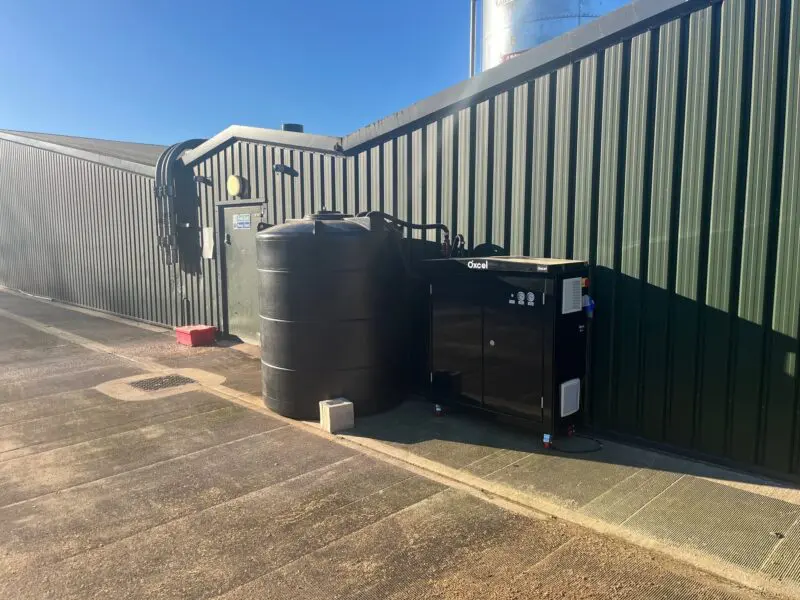
Improving pig and poultry production with water technology
An innovative project that utilises enhanced water technology to boost efficiency and productivity across the livestock industry is gaining momentum.

An innovative project that utilises enhanced water technology to boost efficiency and productivity across the livestock industry is gaining momentum.
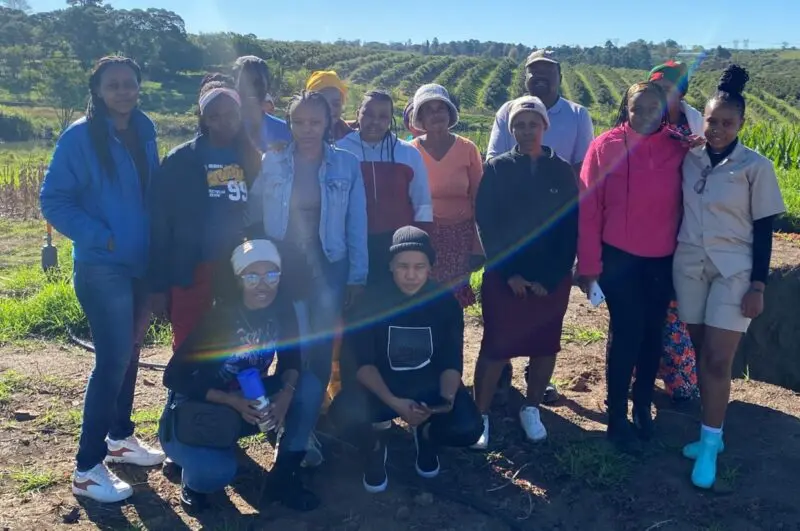
The SWEET SUCCESS project responds to the bio-energy demand and the net zero transition, to increase yields of bio-energy crops, subsequently aiding energy generation, whilst not compromising land-use for food and housing.
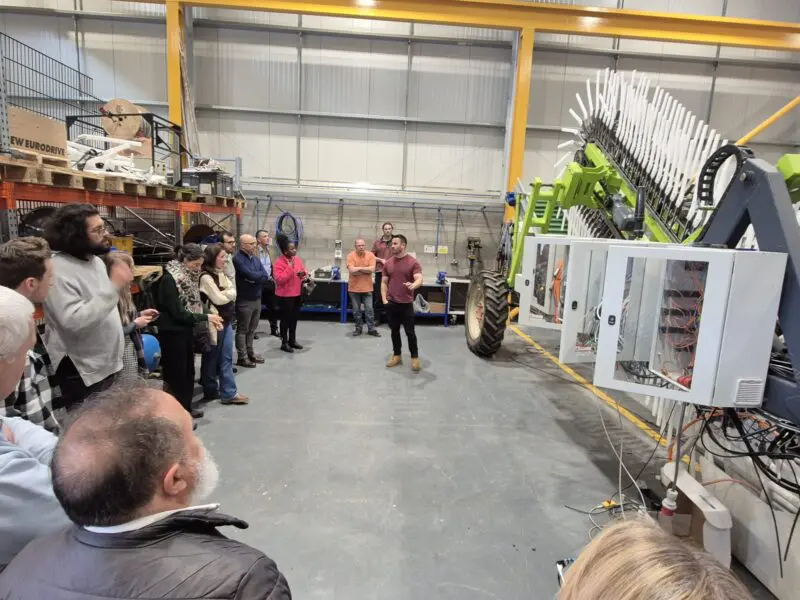
The UK Agri-Tech Centre is delighted to announce the signing of a Memorandum of Understanding (MOU) with the Spanish National Research Council (CSIC), through its Institute of Natural Resources and Agrobiology of Salamanca (IRNASA-CSIC), which will help to advance agri-tech innovations and provides a framework for bilateral collaborations that address global agricultural challenges. The MOU underscores the two organisations’ mutual dedication to promoting agri-tech development, facilitating collaboration and driving forward industry advancement. Both the UK Agri-Tech Centre and the CSIC bring unique strengths to the collaboration projects, leveraging the UK’s expertise that includes precision agriculture, climate-smart technologies and animal health, alongside Spain’s innovations in agroforestry systems, sustainable inputs and renewable energy applications. The vision is to bolster business growth, innovation, research and collaboration in the agri-tech sector—solidifying a shared commitment to addressing global agricultural challenges and enhancing sustainability through joint initiatives. Key areas of collaboration include: Sustainable Agriculture and Climate Resilience Precision Agriculture Digital Agriculture Agri-Food Innovation Knowledge Exchange Linsey Cresswell, Head of Strategic Partnerships and International at the UK Agri-Tech Centre, said: “This Memorandum of Understanding represents a significant step forward in fostering international collaboration to drive meaningful innovation in agri-tech. Together, we aim to build financially viable, resilient and sustainable agricultural systems to address the challenges of climate change and food security.” Mar Siles Lucas, Director of IRNASA-CSIC, said: “This partnership with the UK Agri-Tech Centre demonstrates our shared vision of advancing scientific and technological research to benefit society and the environment. By working together, we can achieve impactful results for both nations and beyond.” Shona Brown, Senior Trade and Investment Adviser at the British Embassy, Madrid, said: “I am delighted to see that the close collaboration between Irnasa-CSIC and the British Embassy in Madrid has contributed to the signing of an MOU which underlines commitment to work closely with the UK Agri-Tech Centre and develop mutually beneficial R&D and commercial opportunities between the UK and Spain.” This closer way of working can only bring positives and encourage solutions to the challenges the agricultural industry is facing, especially within the current climate. It also supports market entry strategies for businesses in both countries and further strengthens the agri-tech sectors in the UK and Spain. For further information about this Memorandum of Understanding, please contact James.Kayam@ukagritechcentre.com or visit www.ukagritechcentre.com to find out more about the work the UK Agri-Tech Centre does.
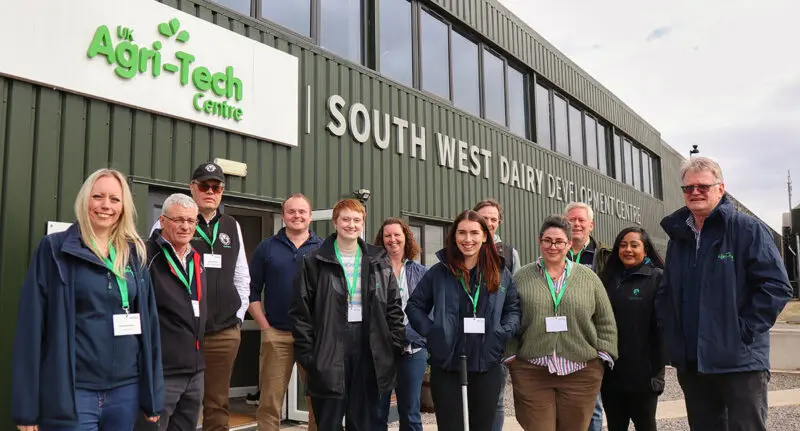
The UK Agri-Tech Centre’s South West Dairy Development Centre (SWDDC) offers state-of-the-art facilities for research, development and demonstration. With a focus on optimising productivity, the centre gathers more data points on individual cows than any other herd in the country to trial agri-tech and new approaches, all while upholding the highest standards of animal health and welfare through technological integration. SWDDC is home to Steanbow Farms’ herd of 200 dairy cows, which makes up an all-year-round calving herd. The data points collected at the centre give a holistic view of the impact that emerging technology has on cow health, welfare and production. Herd fertility at the centre is excellent, which is reflected in current fertility KPI’s with a submission rate to AI at 80%, current conception rate at 45% and an above industry standard pregnancy rate of 35%. The cows make their own decisions on when to eat, sleep and get milked, which leads to a calm, contented herd and an efficient system that helps to enhance cow health and welfare. Mike Jones, Dairy Technical Manager at the UK Agri-Tech Centre, compares the barn and herd to a “happy family on a cruise liner holiday”. The precision grazing system at the SWDDC is a model of efficiency, managing grazing with cow tracks, electric fenced paddocks and a grazing gate across a 42-hectare (104-acre) platform. SWDDC boasts the UK’s first fabric-roofed building, featuring a translucent roof material that transmits 20% of natural light and lightweight steel uprights. A significant upgrade in 2022 saw the relocation of robots to enhance operational efficiency. An upstairs meeting room allows visitors to observe the herd from above, watching them being fed automatically and seeing the cows in a relaxed and calm state. The facility provides an unparalleled environment for developing, testing and demonstrating new technologies and techniques. It supports sustainable, efficient, high-health and welfare and cost-effective milk production. The centre is involved in various innovative projects, including: In 2024, the centre welcomed 1,039 visitors who witnessed firsthand the power of robotics and sensor technology combined with state-of-the-art housing and precision grazing. To learn more or get involved with the South West Dairy Development Centre, contact Dairy Technical Manager Mike Jones at mike.jones@ukagritechcentre.com.

Plasma technology within the agri-tech sector is a sustainable, chemical-free tool with the potential to improve crop production, plant health and fertiliser systems. Already widely applied in sectors such as healthcare, manufacturing and electronics, plasma is now being investigated for its potential to deliver environmental and economic benefits across agriculture. Plasma is often referred to as the fourth state of matter — a charged, energetic state formed when gases like air are exposed to an electric field. When gas is energised to a certain point, electrons are stripped from atoms, resulting in a mix of free electrons and ions. This makes plasma electrically conductive and responsive to magnetic fields. Natural examples of plasma include lightning and the Northern and Southern Lights. In agriculture, these can be used to treat seeds, reduce pathogens, promote plant growth or even synthesise nitrogen fertiliser. Most notably, plasma-activated water (PAW) and on-farm plasma-based fertiliser systems are emerging as viable alternatives to conventional seed treatments, pesticides and nitrogen fertilisers. The UK Agri-Tech Centre is currently supporting innovation in this space through research, business engagement and technology demonstration, working with companies and consortia aiming to bring plasma closer to widespread on-farm application. Plasma in practice While plasma technology remains in the early stages of adoption within agriculture, interest is growing. Cold plasma, generated at low temperatures, is being explored for its ability to enhance plant growth and resilience. By treating seeds and crops with cold plasma, farmers can potentially reduce the need for chemical fertilisers and pesticides. PAW, created by exposing water and ambient air to cold plasma, has shown promise as a natural, residue-free treatment for seeds and crops. Its antimicrobial properties can support disease control, while its ability to stimulate seed germination and root growth positions it as a potential alternative to chemical inputs. Similarly, new systems for producing fertiliser directly on farm using plasma and slurry are being explored as part of a shift towards circular, lower-emission production methods. These technologies align with wider ambitions to reduce reliance on imported fertilisers and improve the sustainability of nutrient management. Industry innovation The potential for plasma in agriculture is being actively explored by several UK-based organisations, some of which are working in collaboration with the UK Agri-Tech Centre and Innovate UK. Looking ahead As pressures mount to reduce synthetic input use, lower emissions, and improve soil health, plasma technology offers a potential route to achieving more sustainable and circular agricultural systems. However, to move from promise to practice, greater focus will be required on technical optimisation, integration with existing farm infrastructure and clearer regulation. Despite these opportunities, several technical, economic and regulatory challenges remain. Plasma systems are often energy-intensive and many have yet to be proven at scale in real-world agricultural settings. Further work is needed to understand the biological interactions, refine delivery mechanisms and build robust, science-led regulatory frameworks to support commercialisation. With targeted research, continued innovation and support from industry networks, plasma-based solutions could play a valuable role in enhancing the resilience and sustainability of UK agriculture in the years to come. If you want to learn more about plasma technology or have any questions, please get in touch via info@ukagritechcentre.com
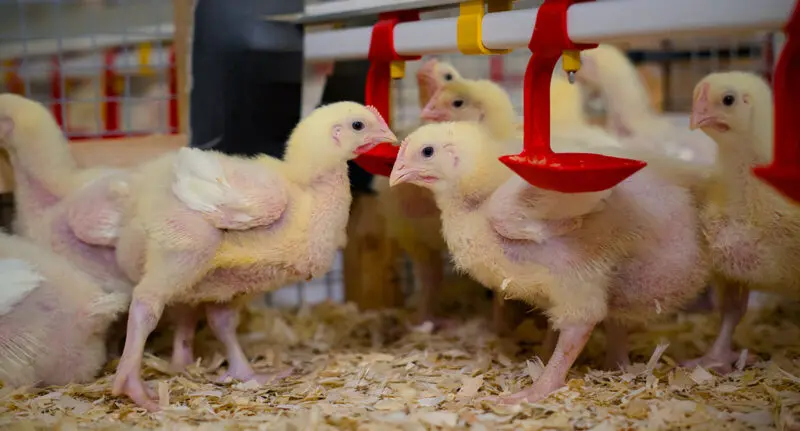
A group of industry professionals is exploring a fishmeal alternative derived from marine protein sources to evaluate potential benefits for gut health and growth performance in meat chickens. The Innovate UK initiative, ‘Farmed Marine Proteins for Poultry Feed’, assessed the viability of using Artemeal – a protein product made from artemia – as a novel replacement for fishmeal in the diets of young broilers. The aim was to monitor health outcomes, optimise growth and reduce environmental impact. Aquanzo Ltd, the project’s lead partner, has collaborated with Scotland’s Rural College (SRUC) and the UK Agri-Tech Centre to introduce a sustainable alternative to traditional fishmeal, offering a long-term solution to the current marine protein ingredient crisis. Traditionally, marine ingredients, in the form of fishmeal, are considered among the most nutrient-rich feed options for young terrestrial animals (like chicks and weanling piglets) and aquaculture species. However, the environmental toll of harvesting wild marine resources is significant, involving substantial greenhouse gas emissions from long distance transport and a delicate reliance on ecosystems already under pressure from climate change. Additionally, as demand for poultry and animal feed has soared in recent decades, marine ingredient harvests have remained relatively stagnant over the past 40 years. This imbalance has driven up costs and pushed fishmeal out of many poultry diets due to economic constraints. Rather than merely identifying substitutes, Aquanzo has taken a different approach by developing technology to cultivate artemia – a marine zooplankton – at scale on land. This sustainable production system transforms artemia into a marine protein ingredient fit for animal feed. What are the benefits? Farming artemia offers a long-term solution to the over-exploitation and use of wild marine protein ingredients. It enables the production of feed that maintains the nutritional advantages of fishmeal without the environmental downsides of ocean harvesting. The process also supports the UK’s circular economy by utilising agricultural byproducts as a feedstock to grow artemia. For feed manufacturers, this means access to a consistent, customisable and high-quality ingredient with lower emissions compared to harvested marine proteins. This level of quality control and sustainability is not achievable through traditional marine sourcing. Aquanzo has conducted a full life cycle assessment (LCA) of Artemeal to support ongoing improvements in sustainable production. Dissemination and knowledge exchange are strong components of this project through engagement with an expert advisory panel and wider stakeholders, to ensure the project aligns with the industry’s technical, environmental and commercial needs. The successful demonstration of Artemeal in starter broiler feed (replacing fishmeal) opened the way to shaping a new sector in the animal feed industry. Alongside other novel protein sources like insect meal and single-cell proteins, farmed marine proteins will support the development of a strong and resilient livestock feed industry across the UK and beyond. What are the impacts? The project will deliver: Farming marine protein has the potential to revolutionise the animal feed sector by combining the nutritional value, taste and energy of marine ingredients, with the scalability and controllable and sustainable precision platforms of farming. Aquanzo estimates that future industrial-scale Artemeal production could yield thousands of tonnes annually. Within five years, this would be enough to supply over 10% of all UK poultry starter diets (for chicks), feeding more than 100m birds. Aquanzo’s broader mission is to deliver Zero Ocean Impact protein alternatives to feed manufacturers, farmers and consumers. This could provide significant productivity and health benefits for farmed animals and improve protein production sustainability by optimising genetics, feedstocks and artemia production systems. Remi Gratacap, CEO of Aquanzo, said: “This project came together thanks to an amazing team who made it all run smoothly. We showed that fishmeal can successfully be upgraded with locally farmed marine ingredients in chick diets, proving a sustainable long-term solution to harvesting wild resources.” Lee Cocker, Project Manager at the UK Agri-Tech Centre, added: “This has been an important and fascinating project and I am extremely proud to have been part of a team that has made such positive advances. The future is bright for Artemeal.” Jos Houdijk and Marwa Hussein, researchers at SRUC, commented: “It was great to observe that birds fed Artemeal during the first days of life outperformed those fed fishmeal and that this carried through to being heavier at harvest. These benefits concurred with beneficial impacts on gut microbiome and immune organs, suggesting a great future of Artemeal for robust, resilient poultry production.” If you want to learn more about the Farmed Marine Proteins for Poultry Feed initiative, get in touch via info@ukagritechcentre.com
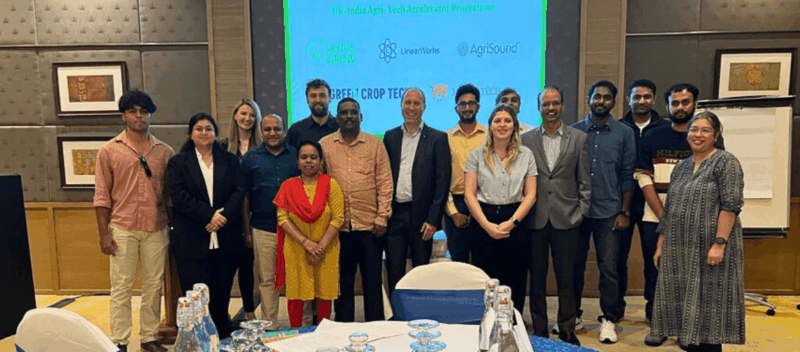
India’s agricultural sector plays a pivotal role on the global stage, with 220 million hectares of cropped land and nearly half of the nation’s workforce employed in agriculture. Between 2023–2024 alone, the country’s agri-exports reached $53 billion, emphasising the importance of food security and economic resilience. Yet, as India strives to modernise and boost productivity, there are clear opportunities for innovative agri-tech solutions. The UK Agri-Tech Centre recently delivered a high-impact UK–India Agri-Tech Accelerator, designed to deepen collaboration between these two nations at the forefront of agricultural innovation. In collaboration with the UK Government, the accelerator was developed to foster links between UK and India’s agri-tech ecosystems, to support sustainable agriculture, strengthen trade and R&D links, and facilitate the commercialisation of cutting-edge technologies tailored to India’s needs. The programme identified key areas of opportunity within the agricultural landscape, with a strategic focus on precision technologies to support climate-resilient crop production. Four key themes were prioritised: · Precision breeding · Crop surveillance technologies · Controlled environment agriculture and precision application systems · Data-driven decision-making tools Five pioneering UK agri-tech businesses were selected to take part in the accelerator, each offering innovative solutions aligned with India’s agricultural priorities: Mutus-Tech – Specialising in AI-driven pest management and fertiliser optimisation. Green CropTech – Delivering nanotechnology-based biostimulants for enhanced crop protection. AgriSound – Deploying bioacoustic sensors to monitor pollination in real time. LinearWorks – Harnessing hyperspectral imaging and drone technology for advanced crop monitoring. LettUs Grow – Innovating in aeroponics for controlled environment farming and yield optimisation. Dr Jenna Ross OBE, Senior International Business Development Manager at the UK Agri-Tech Centre, said: “The aim of the UK–India Agri-Tech Accelerator programme was to establish a network of agri-technology experts, innovators and end users from the UK and India, to create on-going opportunities for agri-tech exchange and partnership, boosting food security and unlocking growth for UK and India based agri-tech businesses. Phase one of the accelerator involved selecting five UK businesses to attend a weeklong curated programme, where they had the opportunity to gain an immersive understanding of India’s agricultural ecosystem, accelerating the opportunity for collaboration and to bring their products to market in India”. A week of immersive engagement The delegation embarked on a weeklong programme across Delhi, Hyderabad and Bengaluru. Through a combination of field visits and workshops, the UK businesses were immersed in India’s diverse agricultural ecosystems, meeting researchers, incubators, investors and government representatives. Each city offered unique insights into regional agricultural priorities and innovation hubs, enabling participating businesses to engage directly with potential partners and stakeholders. Starting in Delhi, the group participated in an ideation and collaboration workshop which included representatives from Government (Indian Council of Agricultural Research ICAR, Ministry of Agriculture), research centres (IARI), incubators (Pusa Krishi), VCs (Think Ag) as well as start-ups and corporates. This workshop facilitated connections with Indian investors and venture capitalists, laying the groundwork for future funding opportunities and partnerships. In Hyderabad, the group visited International Crops Research Institute for the Semi-arid Tropics (ICRISAT), a research centre of the CGIAR consortium (a global partnership uniting international organisations engaged in research about food security), conducting research to develop and improve dryland farming and agri-food systems to address the challenges of hunger, malnutrition, poverty, and environmental degradation in the drylands of Asia and Sub-Saharan Africa. The five companies also participated in an ideation and collaboration workshop with key stakeholders in the region including agri incubators of ICAR, ICRISAT and start-ups. These interactions opened up opportunities for co-development and testing of new technologies in real-world settings. A workshop in Bengaluru identified state level challenges and opportunities for UK-India agri-tech collaborations and included stakeholders from across industry and academia. The delegation travelled to the University of Agricultural Sciences, Bangalore, and participated in a round table discussion where strategic areas for collaboration were identified. They then visited the Centre for Cellular and Molecular Platforms (C-CAMP), an initiative supported by the Department of Biotechnology, which catalyses cutting-edge research and innovation in the life sciences. These engagements helped establish areas for tech testing and validation, crucial for adapting UK technologies to the Indian market. Navneeta Katyan, Co-Founder & CEO of Green CropTech, said: “Overall, the UK-India Agri-Tech Accelerator Programme has enabled us to explore collaborative opportunities, validate our product-market fit in India, and make strategic adjustments to our business plan to support a ‘soft landing’ in the Indian market.” The visits and workshops provided a valuable platform for two-way knowledge exchange with the UK companies showcasing their technologies, and Indian stakeholders sharing potential synergies and real-world challenges, all helping shape future collaborative opportunities. The appetite for collaboration was clear, not only from stakeholders, but from Indian agri-tech innovators keen to explore opportunities in the UK as well. This two-way potential is an exciting next chapter in the UK–India agri-tech journey. Swati Saxena, Senior Science & Technology Officer at the UK Science & Technology Network, British High Commission, Delhi, said: “The UK to India Agri-tech Accelerator visit programme showcased the strength of UK agri-tech innovations and fostered meaningful collaborations with India’s vibrant agri-innovation ecosystem. The UK businesses gained key market insights and identified strategic partners, while Indian start-ups and incubators showed strong interest in collaborating – highlighting a shared drive for sustainable agri innovation.” This programme has laid a strong foundation for future collaborations, reinforcing the shared commitment of both nations to leverage technology for a more resilient and sustainable future. With continued engagement and investment, this initiative promises to drive game-changing innovation, benefiting farmers, agri-tech businesses and wider stakeholders across both countries. If you would like to learn more about the work being done in the agri-food sector both domestically and overseas, get in touch via info@ukagritechcentre.com

That was the question UK Agri-Tech Centre Chairman, Dr Peter Quinn explored in front of an audience of Scottish ministers, MSPs and representatives of Scotland’s rural industry at the Scottish Parliament. So how do we drive agri-innovation for a Net Zero Scotland? Peter writes: It was a privilege to speak in the heart of Scottish democracy about one of the defining challenges of our generation: how we feed a growing global population, while radically reducing emissions and restoring our ecosystems. I was invited to address MSPs and invited guests from across Scotland’s rural sector as part of the Royal Highland and Agricultural Society’s 2025 Presidential Initiative which is highlighting the ways the ways that agriculture is supporting the environment as well as how Scotland’s research institutes and organisations are helping the country to reach its Net Zero targets. It aims to promote Scottish farming as a part of the solution rather than the problem. I also believe that Scotland has the science, the innovation infrastructure and the rooted farming traditions to lead the way. Let’s not sugarcoat the challenge: globally the population is projected to rise by 20% to nearly one billion by 2050. Here in the UK, we are looking at a 13% increase to around 77 million people. And the growth isn’t linear: by 2032, we’ll see a 9% global rise and 7.3% here in the UK. Meanwhile, agriculture uses 70% of the world’s freshwater, emits 25% of all greenhouse gases and occupies 44% of habitable land. In the UK 70% of our land is formed but we still import 40% of the food we eat. And crucially, Total Factor Productivity – a key measure of innovation and efficiency in farming – has dropped by over 5% in the UK over the past year. We’re falling behind key competitors. This is more than a climate emergency; it’s an economic and strategic opportunity to re-imagine how we produce food smarter, cleaner and more locally. The role of innovation Innovation is how we turn ambition into action. At the UK Agri-Tech Centre we’ve focused on three priorities. 1: better measurement, because if you can’t measure it, you can’t manage it; 2: faster adoption of proven low emission technologies, from soil to stomach; and 3: maximising carbon removal without compromising food security. Let’s take livestock: ruminants produce nearly 90% of UK missions but we now have feeds, genetic tools and manual management systems that can reduce emissions dramatically by targeting methane production directly. In crops, fertiliser is the major emitter. Innovations like green ammonia, biological alternatives and better nitrogen use efficiency can shift the dial. And across the board, breakthroughs in data, senses and satellite-linked decision tools are making carbon-smart farming a reality. This isn’t science fiction, it’s science now, but to scale it we need investment, regulation and collaboration to reach Net Zero. Scotland’s innovation ecosystem Scotland is punching well above its weight when it comes to agricultural innovation. At the James Hutton Institute in Dundee, we’ve helped establish a world-leading controlled environment agriculture hub, a state-of-the-art facility for sustainable, tech-driven farming. On Loch Fyne, our Marine Aquaculture Innovation Centre (MAIC) supports cutting-edge R&D and fish health, feeds and environmental impact. Our mobile sensory laboratory takes advanced quality testing tools directly to farms, capturing real-world data that informs breeding market decisions. And through Scotland’s farm network and research partnerships we are proving that breakthrough science can be grounded in practical, on-farm realities. Take iLivestock, for example. It’s a Scottish agri-tech company we’ve supported throughout its growth. With investment from Scottish Enterprise and Kelvin Capital, they’ve tripled their workforce, increased monthly revenue tenfold and now export 78% of their product overseas. Their platform cuts CO₂ emissions by up to 30% by optimising nutrition and life-cycle management, validated by the University of Edinburgh. That’s Net Zero innovation: creating jobs, exports and measurable climate benefit. Policy opportunity But innovation doesn’t happen in a vacuum. Scotland’s Net Zero 2045 target is bold. It’s national innovation strategy is ambitious. Now the task is to align policy with practice. That means enabling precision tech and smart data tools, investing in climate focused businesses and removing regulatory roadblocks that hold back sustainable progress. It means making sure that Scottish science can translate into Scottish solutions for our farmers, food system and future, and it includes exploring technologies like precision-breeding ,approached in a way that reflects our values, our world-class science and our need to stay globally competitive. Above all, it means putting farmers at the centre, not just as adopters but as co-creators of this transition. Scotland has the science, it has the innovators and it has the will. Through smart policy, bold investment and collaborative partnerships like those we’ve built across the UK Agri-Tech Centre network we can turn climate risk into economic opportunity. Because if we get this right, we won’t just hit Net Zero, we’ll build a food system that’s productive, profitable and sustainable for generations to come.
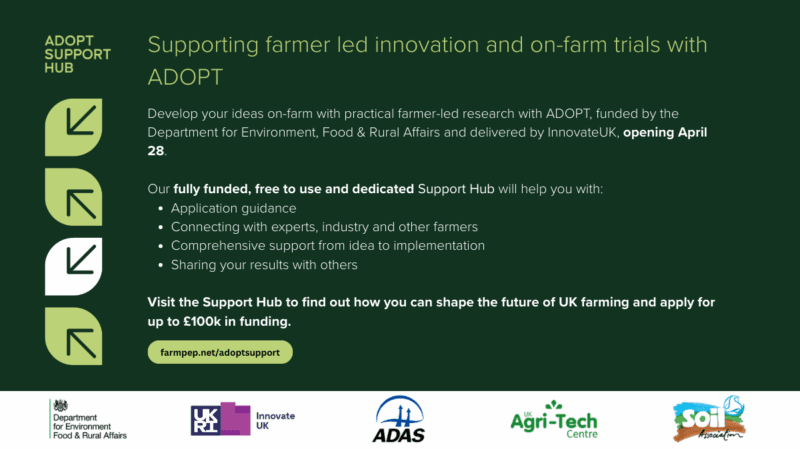
Farmers, growers and foresters in England can now apply for a new round of funding to help trial and test practical solutions to real on-farm challenges, with fully funded, free support from the ADOPT Support Hub. The ADOPT Fund – funded by DEFRA and delivered by Innovate UK – is designed to back farmer-led innovation. Whether it’s trialling a new technology or testing a change in practice, ADOPT offers the funding and support to make it happen. What’s on offer? There are two types of grants available: Support grants (up to £2,500): These help applicants explore their idea and work with a project facilitator to shape a strong proposal. Full grants (up to £100,000): To support farmer-led, collaborative research and innovation projects over 6 months to 24 months. Why this matters The ADOPT Fund is different from previous innovation funding. It’s farmer-led, but collaborative – bringing in others like advisers, researchers, tech providers and other like-minded farmers to help turn your idea into something ready to be adopted more widely in the agricultural community. It’s also focused on practical impact, not just theory. That means funding is aimed at real-world challenges, everyday technology, practices and ideas that aren’t yet widely adopted but could make a difference. You’re not expected to go it alone We understand that most farmers haven’t applied for this kind of funding before. That’s why the ADOPT Support Hub is launching alongside the fund. The Support Hub is fully funded and free to use, providing you with the guidance, resources and connections you need at every step. The Support Hub is here to help you: Whether you’re just exploring an idea or ready to apply, the Support Hub provides the guidance, resources and connections to support you at every step. What is a Project Facilitator? All projects applying for ADOPT competitions must include a Project Facilitator to support project delivery and management. Project facilitators are independent experts who play a required and central role in all ADOPT-funded projects. They bring experience in farmer-led research, Innovate UK grant processes and project management. The ADOPT Support Hub can guide you on how to connect with a suitable registered facilitator – or help you understand how to work with someone you already know, as long as they meet the criteria. We want to hear from you We’re actively encouraging applications across the full spectrum of farming types, regions and communities. Whether you’re a grower, forester, livestock farmer, arable producer or part of a local farming group – we want to hear your ideas, challenges and opportunities. If you’ve got a hunch that something could be improved on-farm, this is your chance to try it with support. Interested in becoming a Project Facilitator? For information, visit the Facilitator FAQ’s on the Business Connect site.
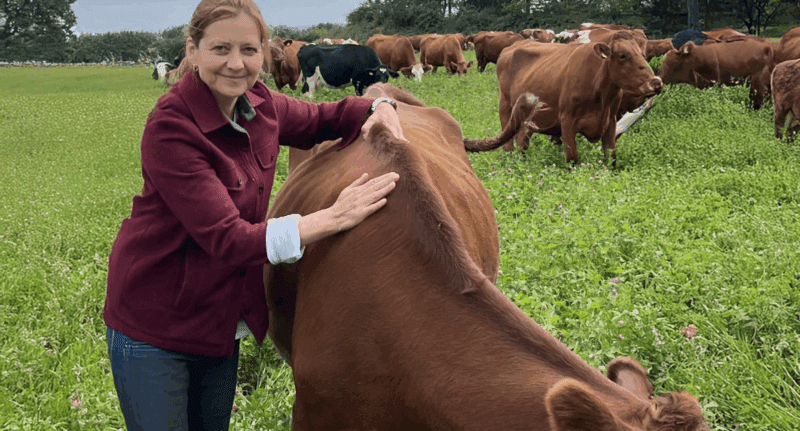
Hemsworth Farm, run by Sophie Alexander, is a 500-hectare organic farm in Dorset, combining arable and dairy farming with a strong focus on sustainability. Certified organic since 2014, the farm prioritises soil health, biodiversity and regenerative practices. In 2020, Sophie introduced a herd of 300 Viking Red heifers as part of a broader effort to enhance ecological balance, improve soil fertility and support the long-term resilience of the farming system. Innovation story Recognising the critical role of biodiversity in sustainable agriculture, Hemsworth Farm collaborated on the Biodiversity Monitoring 24/7 Project funded by Innovate UK and DEFRA’s Farming Innovation Programme in an early-stage investigation into how technology can be used to monitor biodiversity in agriculture. This project aimed to test and demonstrate the effectiveness of digital technology for remote wildlife monitoring in a farming context. Three separate remote sensing digital technologies were deployed to detect, identify and quantify varieties of invertebrates and birds, correlating their presence to the flowering plants they rely on. The project provided valuable insights into pollinator activity across different areas of the farm. The highest levels of pollinator activity were recorded in a flowering forage crop, which attracted 21.6% of the total insect activity. This was likely due to the crop’s rich nectar supply, making it more attractive to pollinators than other areas such as permanent pastures and herbal grass mixes. Sensors allowed for continuous, real-time data collection, helping to build a clearer picture of where and when pollinators are most active. These findings highlight how digital monitoring technology can support biodiversity assessments and help farmers make informed decisions about land management to benefit both wildlife and food production. “Collaboration is key to making this technology as useful as possible. By combining multiple monitoring techniques, we can make data-driven decisions that support biodiversity, improve farm resilience and ensure a sustainable future for the next generation.” – Sophie Alexander Collaboration and support The project brought together several key partners: If you would like to learn more about Hemsworth Farm and its work, please get in touch via info@ukagritechcentre.com
We’re focused on all areas of crops, livestock and engineering and exploring new sectors within food, feed, fuel and fibres.
Join a diverse community from industry and science, committed to transforming UK food and farming. Doing better for businesses, the future of the agri-food sector and the planet.
We welcome all enquiries, fill in the form and we’ll be in touch.
© Copyright the UK Agri-Tech Centre Ltd. 2025